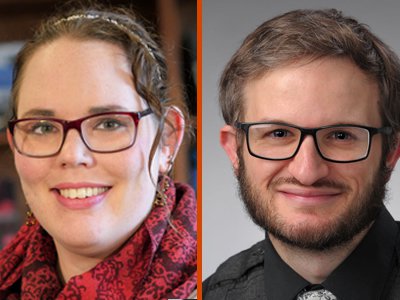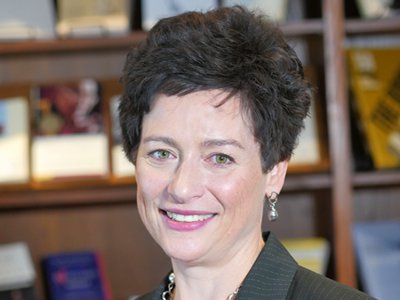Humanities Center Dissertation Fellows to Discuss Research Jan. 26
Maria Carson, T.J. West are 'University citizens,' Humanities Center director says

The Humanities Center's two Dissertation Fellows are presenting a special program in the Tolley Humanities Building.
Maria Carson and Thomas J. (T.J.) West III—Ph.D. candidates in religion and English, respectively—will provide an overview of their research on Friday, Jan. 26, from 9:30-11:30 a.m. in 304 Tolley. The event is free and open to the public, and includes coffee and light breakfast.
For more information, visit humcenter.syr.edu, or call 315.443.7192. The Humanities Center is in the College of Arts and Sciences (A&S).
Vivian May, director of the Humanities Center and professor of women’s and gender studies (WGS) in A&S, considers Carson and West promising young scholars.

“Maria and T.J. have distinguished themselves as University citizens,” she says. “Both of their projects are suffused with strong humanities content and methods, and contribute to advancing the field of the humanities.”
Carson belongs to the Department of Religion, where her graduate concentration is in “Critique, Image and Politics.” Her talk, "Gender as an Affective Tool in the Thought of Abraham Joshua Heschel," considers the role of gender in his 1951 book "The Sabbath."
Although Heschel does not explicitly discuss women in "The Sabbath," Carson notes an "affective femininity" that is central to his larger argument about Jewish ritual time and space.
"This conception of gender as an affective technology illustrates how women in 1950s Jewish America were increasingly concerned with 'marketing' Judaism to children and the broader community," Carson says. "To understand this cultural context is to understand how Heschel's work was impacted by the larger American Jewish sociopolitical landscape."
Carson's dissertation, "A Tzaddik Sighs: Abraham Joshua Heschel, Affect and Nostalgia," explores the prolific writings of Heschel, a major theological force in postwar United States. In addition to "The Sabbath," his many books include "Man Is Not Alone: A Philosophy of Religion" (1951) and "God in Search of Man: A Philosophy of Judaism" (1955).
"Heschel rarely talks explicitly about bodies or the gender of these bodies. He does, however, talk quite expansively about affect," says Carson, whose advisor is Zachary Braiterman, professor of religion and director of Jewish studies in A&S. "A robust understanding of Heschel’s thinking on bodies and affect helps us place together his own life story as a refugee from the Holocaust and his political and activist work alongside his theological work."
Prior to Syracuse, Carson earned a master’s degree in Jewish thought from the Jewish Theological Seminary in New York City and bachelor’s degrees in religious studies and theater management from DePaul University in Chicago.
Like Carson, West thrives on interdisciplinary research. His talk is titled "Paradise Lost: Melancholic Utopia and the Experience of History in 'Cleopatra.'" A sprawling love story depicting the struggles of a young Egyptian queen fending off the imperial ambitions of Rome, “Cleopatra” combines what West calls “time-stopping utopian spectacles” with the despair of inevitable historical decline.
“We get a sense of hopeful mourning for a brighter future that the film never brings to fruition,” says West, adding that “Cleopatra” both reflected and challenged American culture of the ’60s. “It expresses the profound uncertainties of a Cold War American culture struggling to find its place when the future seemed uncertain, due to the ever-present possibility of atomic war.”
A scholar of classic Hollywood cinema, West studies under Steven Cohan, Dean’s Distinguished Professor Emeritus, and Roger Hallas, associate professor of English. His dissertation, "History’s Perilous Pleasures: Experiencing the Terror of History in the Historico-Biblical Epic," examines the film genre that flourished during the 1950s and ’60s, with its grandiose depictions of the ancient world.
"I argue that the historico-biblical epic takes the pressure of the terrifying possibility of the end of human history engendered by the atomic bomb and transmutes this into a series of dialectics, between agency and powerlessness, embodiment and transcendence, desire and death, imperial splendor and its impending decline," West says. "While antiquity seems to offer the modern world the ability to escape from the imminence of a nuclear armageddon and the possibility of no future, the epic renders visible and forces an encounter with the very terrors it seeks to escape."
West earned a certificate of advanced study in WGS from Syracuse and bachelor’s degrees in English, history and classics from Marshall University.
Every year, the Humanities Center awards Dissertation Fellowships to two deserving Ph.D. candidates completing their dissertations in A&S. Each fellow receives $1,800 toward his or her research, along with access to shared workspace and equipment in Tolley.
Doctoral students in composition and cultural rhetoric, English, philosophy and religion are invited to apply for the 2018-19 Dissertation Fellowships. The application deadline is Friday, Feb. 9.
Now in its 10th year, the Humanities Center cultivates diverse forms of humanities scholarship, sponsors a range of dynamic programming and partnerships, highlights the humanities as a public good and underscores the relevance of the humanities for addressing enduring questions and pressing social issues.
